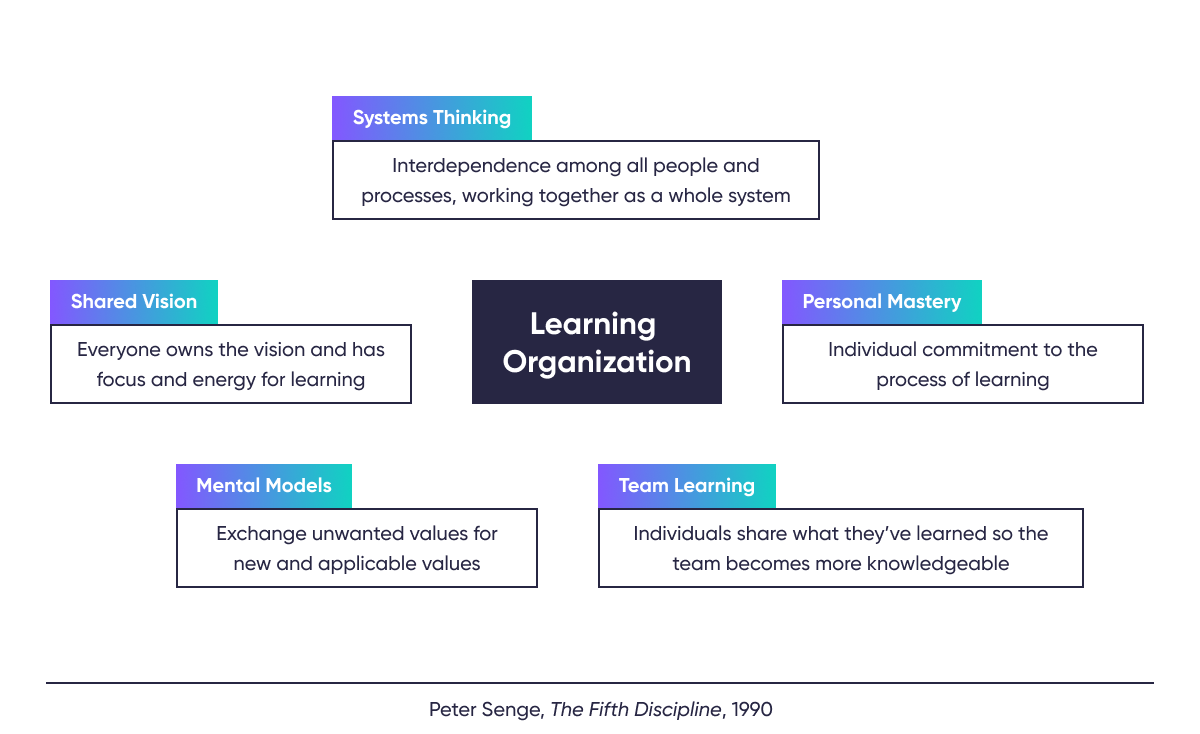Becoming a Learning Organization Through the Five Disciplines
Posted on March 05, 2019
Updated: June 23, 2022
It’s not uncommon to think about the secret to success and prosperity in today’s world of rapid and radical change.
In the book, The Fifth Discipline, the author Peter Senge has introduced us to a set of guiding principles. These principles enable evolving organizations to convert to a “learning organization.” To strive for these aspirational principles means moving towards functional integration, group learning, collaboration and continuous growth.
Organizations that have adopted this learning model have set themselves for a holistic approach to challenges. Because every element in a system is interconnected, tackling them in isolation isn’t beneficial.
Although these five disciplines were created more than 20 years ago, they are more relevant now than ever before because of ongoing economic barriers and disruptive technologies. In today’s blog, we will discuss these five principles and learn how we can apply them for personal and professional growth.
The five disciplines to becoming a learning organization
1. Systems Thinking
Systems thinking means envisioning the overall structure of an organization and the interconnectedness of its elements. Your organization is a complex system, and like anything in a dynamic environment, it must continually adapt and improve to survive.
2. Personal Mastery
Personal mastery means a commitment to personal growth and self-awareness on the part of the individual. It is observing the impact of one’s behaviour on a group of people and being willing to have one’s personal beliefs and values challenged.

3. Mental Models
Mental models refer to deeply ingrained assumptions and generalizations that influence how people understand the world. Reframing one’s mind for flexibility, learning and adapting allows one to overcome mental blocks and move to the vision of where a company is going.
4. Shared Vision
Most of the time, the founder has a vision of how they want the company to evolve and grow in the future. But Senge has a different approach to organizational vision. According to him, a shared vision is about building a sense of commitment in a group. By developing shared images of the future, we seek to create the principles and guiding practices by which we hope to get there. Organizations must be open to change and willing to modify and change their vision over time. As the organization evolves and grows, so should its vision.
5. Team Learning
Conversation, reflection, and inquiry in a team setting can build the foundation for a shared vision of change. When teams are composed of diverse people who start “thinking together” and sharing experiences, it is the best way to find innovative solutions to problems.
Why Schulich ExecEd’s Masters Certificate in Organization Development and Change?
Lifelong learning is crucial for an organization that focuses on constant improvement and productivity. The more people in an organization improve, the more value they can bring to the company. Schulich ExecEd’s Masters Certificate in Organization Development and Change helps managers and leaders support organizational change at any level through design and facilitation for maximum benefit.
Schulich ExecEd provides academic advising to help you identify resources and support for your program. To learn more about program information and program requirements, contact an advisor today.













